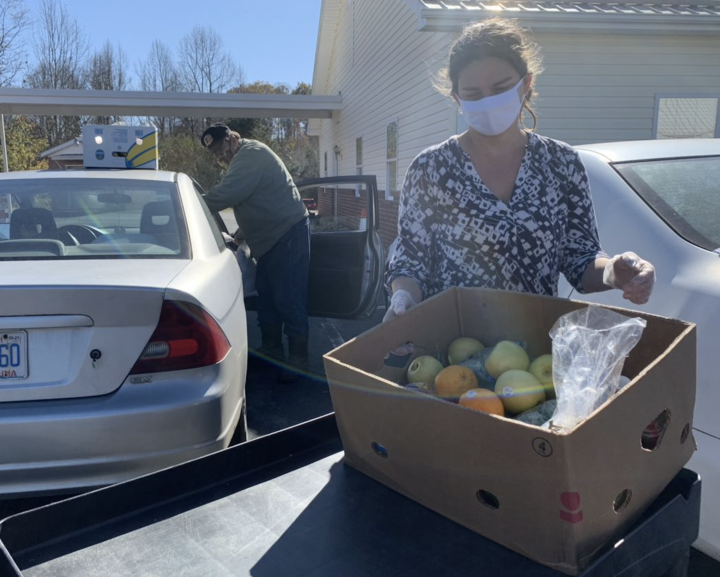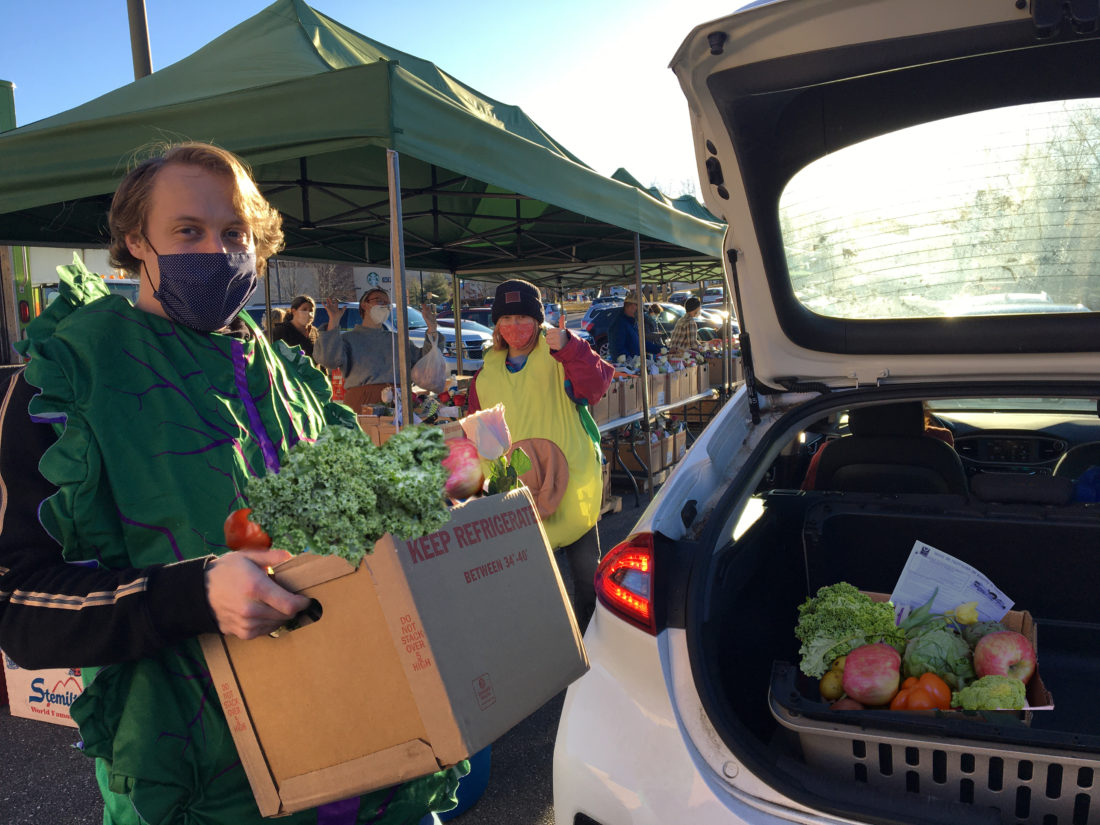by Mary Catherine McAnnally Scott
Before the COVID-19 pandemic, MANNA FoodBank served an estimated 60,000 to 70,000 people per month across 16 Western North Carolina counties. Over the last 18 months, that number has skyrocketed. “In October of last year, for example, we served over 140,000 people,” says Kara Irani, the nonprofit’s director of marketing and communications.
Like MANNA, other local food-based nonprofits are seeing a rise in demand for assistance as well. But with the global health crisis still impacting daily life, many of these organizations continue to experience major disruptions.
“There’s an arm of [our] organization that rescues perfectly edible, beautiful food that would otherwise end up in the landfill,” says Ali Casparian, executive director of Bounty & Soul. “[It comes] from Whole Foods, Trader Joe’s or Sam’s Club.”
But with interruptions in delivery schedules due to understaffing or no-show drivers, the food that would normally be rescued by food banks is at risk of spoiling en route, say local nonprofit leaders. A typical problem, notes Casparian, is that grocery store managers make arrangements for trucks that don’t arrive. Then, days later and sometimes with little warning, the fully stocked truck appears at the grocery, ready to be unloaded onto store shelves.
“Those disruptions trickle down to me,” Casparian explains, “because those trucks don’t come in on time. If the truck shows up and they don’t have staff, the food sits there. By the time they do get staff, I’ve already missed three days of pickups.”
Learning to pivot
In response to these ongoing supply chain woes and other COVID-19-related issues, WNC’s food-based nonprofits have had to come up with creative solutions of their own.
“Our model was based on in-person large gatherings where we’d see 100-150 households coming into a space, having classes, cooking together, shopping and eating,” says Casparian. “Everything was set up like a farmers market, and our clients had choice.”
Now, both Bounty & Soul and MANNA have switched to a drive-thru option, where customers can receive their food safely. Implementation of the new systems wasn’t without hiccups, though.
“We had 450 households showing up in downtown Black Mountain, driving through to get their groceries,” Casparian recalls. “The police chief had to call me because we were shutting down traffic in Black Mountain.” Since then, Bounty & Soul has relocated to a supermarket parking lot, where its staff can accommodate large numbers of cars as traffic snakes through a streamlined path.
Meanwhile, MANNA has shifted from relying on regular donations to sourcing and purchasing food itself. Before the pandemic, around 85% of the nonprofit’s inventory was donation-based; currently, only 65% of its supply comes from donors, and the rest is purchased.
“We’re often able to buy it at discounted, wholesale prices,” says Irani. “Our purchasing power can be pretty strong. But when the supply chain is locked up, it can be really hard to find. We continue to make lots of deep connections with local farmers.”

The Appalachian Sustainable Agriculture Project has been essential to helping those very farmers create strong relationships with smaller food banks and child care centers. Sarah Hart, communications manager, says that ASAP launched its Appalachian Farms Feeding Families program to serve this particular pandemic-era need.
“Farmers had lost a lot of restaurant markets,” says Hart, “and we knew something needed to change to support them.”
ASAP, through grants and outside funding, was able to create a win-win situation for food banks and farmers: The food banks and feeding centers received fresh, locally grown produce; participating farmers got compensated at market price for food that otherwise might go to waste.
“To date,” says Hart, “the program works with 73 feeding sites and 56 farms, working in 23 Western North Carolina counties and the Qualla Boundary.”
Retaining respect
While local nonprofits have changed a lot about their practices, one thing has stayed steadfast: the respect and dignity shown to their clients.
“We try to make sure that everybody who’s coming to access food feels like they’re not coming to a charitable organization but that they’re coming to a market,” says Irani.
Doing so helps destigmatize the need for food assistance, which is important Irani notes, as many people now receiving aid are doing so for the first time. “We had people coming through constantly saying, ‘I’ve never been in this position. I didn’t know what to do. I’m so grateful this is here,’” she says.
To retain its sense of connection and continue to provide choice for clients, Bounty & Soul now offers recipe card suggestions in each takeaway parcel of groceries. Says Casparian, “We have a nourishment guide that goes out in every box. It spotlights the farmers that helped to put the food in the box this week, three recipes, and a couple of nutrition and cooking tips.” Each card is uniquely designed based on the ingredients in the box.
Furthermore, volunteers at Bounty & Soul continue to dress in fruit and vegetable costumes to give children, often in the car with parents for a pickup, something exciting to look forward to. Boxes are even adorned with fresh flowers and handwritten notes.
“Taking the stigma out of reaching out for help is a huge piece of advocacy for families in our area that are struggling,” says Irani of the 90,000 to 100,000 clients per month the nonprofit continues to serve. She encourages community members to share MANNA’s help line information, where people in need can call to receive instant information about food availability and to find out if they’re eligible for the Supplemental Nutrition Assistance Program. “It could be any one of us. That’s why we work so hard to keep this community supported.”
For information about volunteering, please visit mannafoodbank.org, bountyandsoul.org and asapconnections.org. For food assistance and information about SNAP eligibility, call 800-820-1109.



Before you comment
The comments section is here to provide a platform for civil dialogue on the issues we face together as a local community. Xpress is committed to offering this platform for all voices, but when the tone of the discussion gets nasty or strays off topic, we believe many people choose not to participate. Xpress editors are determined to moderate comments to ensure a constructive interchange is maintained. All comments judged not to be in keeping with the spirit of civil discourse will be removed and repeat violators will be banned. See here for our terms of service. Thank you for being part of this effort to promote respectful discussion.